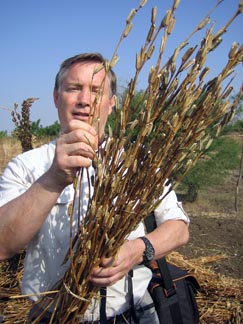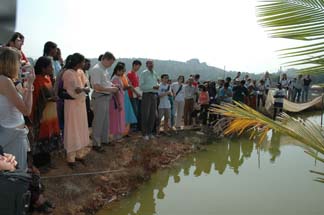International agriculture course alters the lives of students by taking them to developing nations
By Sarah Davidson

The temperature in Goa, India, last January was a scorching 90 degrees hotter than it was in Ithaca.
Cornell University's K.V. Raman, known as "K.V." to those around him, wiped his brow and replaced his red Cornell baseball cap as he stepped off the bus into the blazing sun. About 80 students and several Cornell faculty members followed him into the salty, sticky air and headed down to the fishing village to discuss the Goan fishing industry with local fisherman.
Raman, associate director of international programs in Cornell's College of Agriculture and Life Sciences (CALS), doesn't run a typical classroom. As the primary professor for the course Agriculture in Developing Nations (International Agriculture and Rural Development [IARD] 402), his classroom is global.
For some students the experience he offers is year-round and sometimes so profound it can change lives and research plans. Distinguished alumni include Hubert Zandestra, former director general of the International Potato Center in Lima, Peru; Dan Makunga, dean of the College of Agriculture at the University of Nairobi, Kenya; and Robert Ziegler, director general of the International Rice Research Institute in the Philippines.
Each fall, about 50 students take the prerequisite course in Ithaca; another 25 or 30 tune in via video links in India. In January, the Cornell and Indian students unite in India for three weeks to experience firsthand agriculture, postharvest food processing, rural extension, marketing and social-equity issues in a country of more than 1 billion people. In the spring, students reflect on their experiences and prepare papers related to their field trip research in the companion course (IARD 602).
This semester, 56 Cornell and 26 Indian students are taking IARD 402 and listening to stories from January's trip; Raman estimates that about three dozen Cornell students will participate in next January's field trip and spring semester course .

"It's a win-win situation -- both faculty and students gain by learning through real cases in a developing country context," said Raman, who noted that in past years, the trips have focused on other developing countries, such as Honduras and Ecuador, but has centered on India since 2002.
"By visiting places and interacting with farmers, NGOs and policymakers in three of the most important southern agricultural states of India, students get a rich learning experience, which one can never get by reading books or through lectures in a classroom setting," Raman explained.
Ronnie Coffman, professor of plant breeding and director of international programs at CALS, has been associated with the course for more than 30 years, first as a student in the 1960s. "I've seen the course evolve from its beginnings, when it focused mostly on production agriculture on the tropics. It soon broadened to include socio-economic and development issues, and then expanded further to provide insights into the issues of globalization and transnational communities as exemplified in India," he said. "The consistent thing about the course is that it often represents a life-altering experience for the students."
The course changed the plans of at least three of last year's participants in the course in India who returned to South Asia this summer. Master's degree student Keith Poe went to Bangladesh to examine how women's self-help groups in poor countries form and generate income by promoting the sale of locally made handicrafts for export to richer countries. His thesis focuses on what type of organization is most effective for reducing rural poverty. "The IARD course contributed to my preparedness for my research," said Poe. "The self-help groups that I focused on for the course helped me recognize similar groups in Bangladesh and gave me a better idea of what the whole self-help group philosophy is and how the movement has grown."
Elizabeth Newbold, a senior majoring in IARD, forged connections through the course last year that allowed her to spend three months over the summer testing varieties of peanuts for salt and drought tolerance and developing efficient ways of producing millet and pigeon peas hydroponically at the International Crop Research Institute for the Semi Arid Tropics (ICRISAT) in Hyderabad, India -- a site the course visited last January.
"The course trip allowed hands-on experience with Indian agriculture that made me want to pursue it further and learn more about Indian agriculture," Newbold said.
Nutrition graduate student Christina Nyhus also spent the summer at ICRISAT, focusing on how modernized agriculture affects micronutrient intakes in rural populations. "One of the strengths of the course trip is that it is such a multidisciplinary group of people who are involved, providing a unique opportunity to understand the perspectives of students and professors who approach the same problems so differently," she explained.
In addition, several of the Indian students in last year's course have applied for postdoctoral fellowships or graduate studies at Cornell. "Through the interaction between Cornell and Indian students, Cornell is able to attract the bright minds of India to apply to Cornell, keeping with the tradition of bringing the best of the best to our campus," Raman said.The course also serves as a model to promote international educational experiences for other major universities. "We are hopeful that this will further forge strong linkages and enhance learning for Cornell students," said Raman, noting that Cornell will showcase the course at a U.S.-India partnership conference in January 2006.
Cornell faculty and staff who participate in the course include: Terry Tucker, Syed Rizvi, Elizabeth Earle, Tony Shelton, Robin Bellinder, Stefan Enarson, Rosalind Cook and Yamin Chevallard.
Funding through the USAID-Association Liaison Office for University Cooperation in Development supports the course. Associates at Sathguru Management Consultants host the course and Cornell programs in India.
Sarah Davidson is a writer intern at the Cornell News Service.
Media Contact
Get Cornell news delivered right to your inbox.
Subscribe